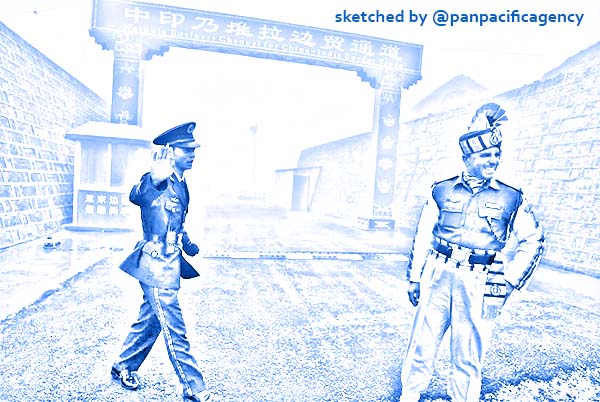China’s borders will likely remain shut for months

A Chinese soldier (L) and an Indian soldier (R) stand guard at the Chinese side of the ancient Nathu La border crossing between India and China. Photo: AFP/Diptendu Dutta. Sketched by the Pan Pacific Agency.
HONG KONG, Jul 21, 2021, CNN. Last week, the Biden administration warned American companies about the risk of doing business in Hong Kong, citing Beijing’s increasing crackdown on the city. “The bottom line is that businesses should be aware that the risks faced in mainland China are now increasingly present in Hong Kong,” White House press secretary Jen Psaki told reporters, CNN reported.
But long before the warning, some Americans and other Westerners with long-lasting professional ties with China had already grown wary of visiting both mainland China and Hong Kong.
Last month, online magazine ChinaFile said among 121 China-connected scholars, journalists, former diplomats and civil society workers it surveyed, only 44% said they planned to travel to China once coronavirus restrictions are lifted; 40% said they probably or definitely would not visit, while the rest were unsure.
Though not a scientific survey, the results nevertheless suggest a significant shift in attitudes among a group of prominent figures in the China field, most of whom would almost certainly have planned to travel to the country a year or two ago as part of their professional routines, it said.
“Among those who replied they would probably or definitely not visit, reasons ranged from previous visa rejections to outright fear of detention for themselves and for the Chinese people they work with or interview, and concerns that restrictions on movement, research, or reporting would compromise the professional value of spending time in China,” said ChinaFile, which is published by the Asia Society’s Center on US-China Relations.
In the article, many respondents cited the ongoing detainment of Canadians Michael Kovrig and Michael Spavor as a primary source of their anxiety.
It’s been four months since Kovrig and Spavor were tried behind closed doors and 953 days since they were detained, but Beijing has not released any news on either of the men.
Kovrig, an NGO worker and former diplomat, and Spavor, a businessman with a focus on North Korea, were detained following the arrest of Huawei executive Meng Wanzhou in Vancouver. Beijing has charged them with espionage, but most outside of China see their detention as retaliation for Meng’s arrest and a bargaining chip to help leverage her release.
“It’s bad enough to have to worry you’ll be jailed in retaliation for whatever critical comments you made even years ago. It’s much more unsettling to think you could be thrown in jail as a hostage simply because you hold an American passport, the way Michael Kovrig and Michael Spavor were thrown in jail as Canadian hostages, in retaliation for something my government did that the Chinese regime didn’t like,” wrote James Mann, a journalist and author on China.
For many, the continued detention of the two Canadian Michaels will likely serve as a chilling reminder of the risks associated with visiting China, even after it reopens its borders to the world.
And so far, Chinese authorities have shown little urgency in reopening. Unlike smaller economies that rely heavily on cross-border capital flows, outside talent or international tourism, Covid-19 border restrictions have not stopped China from roaring back into growth.
A closed border also gives the Chinese government more control on who they want to let into the country. Beijing expelled at least 18 foreign correspondents last year, and few Western outlets have been granted visas for new journalists to be based in China, according to the Foreign Correspondents’ Club of China.
Meanwhile, tens of thousands of international students enrolled in Chinese universities have been barred from returning to the country, with many voicing frustrations on Twitter and tagging Chinese diplomats for help — to no avail.
Given China’s zero tolerance for Covid cases, it is likely that some restrictions might stay in place until the Beijing Winter Olympics next February, or even as late as the 20th Communist Party Congress next fall — both politically important events of which Beijing wants to ensure absolute success.
Like elsewhere, the pandemic has changed China in many ways — some of which might add to the concerns of foreigners who plan to visit.
Visitors will be greeted by expanded digital surveillance, which played a central role in China’s successful containment of the virus. Their everyday movements will be tracked by a mandatory smartphone “health code” app, required for entry to office buildings, restaurants, shopping malls and train stations. Facial recognition cameras, already common in public places, have also proliferated in residential areas.
Meanwhile, nationalistic sentiment, which was already rising in China prior to the pandemic, has reached new heights.
Many Chinese are proud — rightfully — of China’s ability to swiftly tame the outbreak, despite its initial mishandling. But Chinese officials and state media have also pushed the narrative that it is a further vindication of Beijing’s rise — and the West’s decline.
But with the borders yet to fully reopen, it remains to be seen how much of the surging ultra-nationalism online will affect everyday actions and encounters.